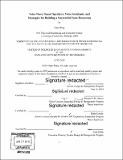| dc.contributor.advisor | Michael A.M. Davies and Blade Kotelly. | en_US |
| dc.contributor.author | Wang, Hans,S.M.Massachusetts Institute of Technology. | en_US |
| dc.contributor.other | Massachusetts Institute of Technology. Engineering and Management Program. | en_US |
| dc.contributor.other | System Design and Management Program. | en_US |
| dc.date.accessioned | 2019-09-17T19:51:10Z | |
| dc.date.available | 2019-09-17T19:51:10Z | |
| dc.date.copyright | 2019 | en_US |
| dc.date.issued | 2019 | en_US |
| dc.identifier.uri | https://hdl.handle.net/1721.1/122259 | |
| dc.description | Thesis: S.M. in Engineering and Management, Massachusetts Institute of Technology, System Design and Management Program, 2019 | en_US |
| dc.description | Page 99 blank. Cataloged from PDF version of thesis. | en_US |
| dc.description | Includes bibliographical references (pages 96-98). | en_US |
| dc.description.abstract | In recent years, voice-powered digital assistants have exploded into the consumer mainstream as an important new form of human-computer interaction. Powered by dramatic improvements in speech recognition and artificial intelligence (Al) technologies over the last decade, digital voice assistants are now abundantly prevalent in modem consumer electronic devices ranging from mobile phones, to smart speakers, to wearables. As the technology matures and the availability of big data used by digital assistants proliferates, voice will soon become a primary modality by which people interact and accomplish tasks. Many of these tasks will be accomplished in consumer homes and digital voice assistants present a significant new opportunity where voice and the physical home intersect to dramatically reshape how consumers live in their home. | en_US |
| dc.description.abstract | This also represents a tremendous opportunity for companies in the digital assistant industry, and, in order to successfully leverage this nascent technology, they will need to understand both their own strategic goals as well as their direct and indirect competitors' strategies in building a business ecosystem around voice-first digital assistants. A fierce struggle has begun - not just amongst current technology titans (i.e. Google, Amazon, Apple, Microsoft), but also involving key incumbent players in the home media and electronics industry (e.g. Samsung, Sonos, Bang & Olufsen). | en_US |
| dc.description.abstract | The goals of this thesis, with respect to the current industry leaders in the digital assistant and smart home space, are to 1) understand the current landscape of the digital assistant voice ecosystem, 2) elucidate each major players' current voice-powered digital assistant platform strategy, 3) analyze the consumer adoption, selection, and diffusion mechanisms for digital voice assistants in the consumer smart home, and 4) determine what the likely outcomes are for each major player as well as the likelihood of success and associated risks with the current ecosystem and platforming strategies employed. Finally, through additional market analysis and industry projections, strategic recommendations will be presented to guide each key player over the next decade. Following these recommendations will be key to winning the digital assistant voice wars and for creating a successful and sustainable voice technology ecosystem in the personal digital assistant market. | en_US |
| dc.description.statementofresponsibility | by Hans Wang. | en_US |
| dc.format.extent | 99 pages | en_US |
| dc.language.iso | eng | en_US |
| dc.publisher | Massachusetts Institute of Technology | en_US |
| dc.rights | MIT theses are protected by copyright. They may be viewed, downloaded, or printed from this source but further reproduction or distribution in any format is prohibited without written permission. | en_US |
| dc.rights.uri | http://dspace.mit.edu/handle/1721.1/7582 | en_US |
| dc.subject | Engineering and Management Program. | en_US |
| dc.subject | System Design and Management Program. | en_US |
| dc.title | Voice wars : smart speakers, voice assistants, and strategies for building a successful voice ecosystem | en_US |
| dc.title.alternative | Smart speakers, voice assistants, and strategies for building a successful voice ecosystem | en_US |
| dc.type | Thesis | en_US |
| dc.description.degree | S.M. in Engineering and Management | en_US |
| dc.contributor.department | Massachusetts Institute of Technology. Engineering and Management Program | en_US |
| dc.identifier.oclc | 1119555548 | en_US |
| dc.description.collection | S.M.inEngineeringandManagement Massachusetts Institute of Technology, System Design and Management Program | en_US |
| dspace.imported | 2019-09-17T19:51:07Z | en_US |
| mit.thesis.degree | Master | en_US |
| mit.thesis.department | SysDes | en_US |
